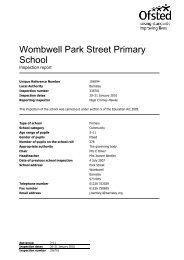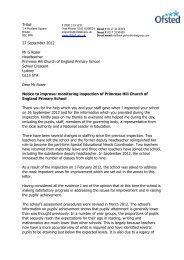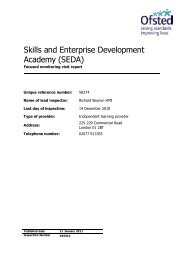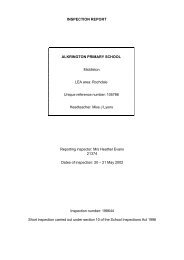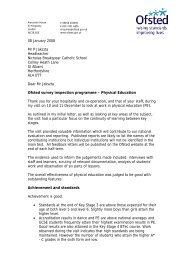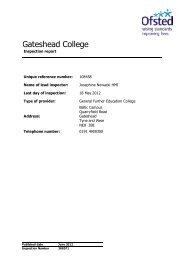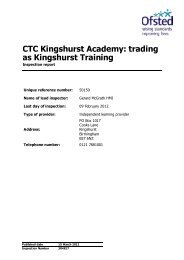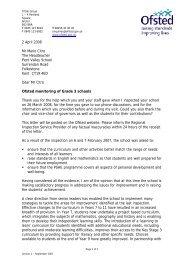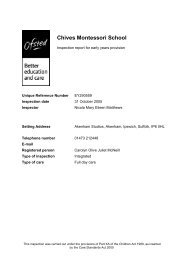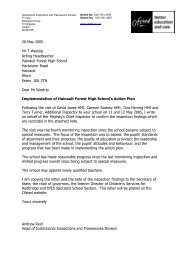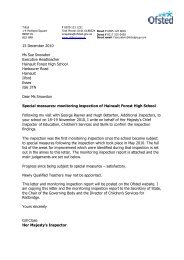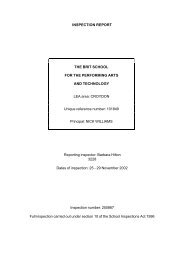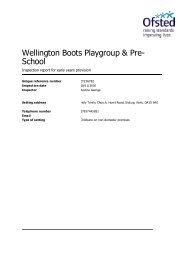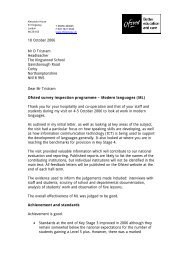Annex B: the Childcare Register - Ofsted
Annex B: the Childcare Register - Ofsted
Annex B: the Childcare Register - Ofsted
You also want an ePaper? Increase the reach of your titles
YUMPU automatically turns print PDFs into web optimized ePapers that Google loves.
Yarrow House Nursery School<br />
Inspection report for early years provision<br />
Unique reference number EY410548<br />
Inspection date 18/07/2011<br />
Inspector Jean Thomas<br />
Setting address 80a Manchester Road, SOUTHPORT, Merseyside, PR9 9BJ<br />
Telephone number 01704 534855<br />
Email info@yarrowhouse.co.uk<br />
Type of setting <strong>Childcare</strong> on non-domestic premises
Inspection Report: Yarrow House Nursery School, 18/07/2011<br />
The Office for Standards in Education, Children's Services and Skills (<strong>Ofsted</strong>) regulates and inspects<br />
to achieve excellence in <strong>the</strong> care of children and young people, and in education and skills for<br />
learners of all ages. It regulates and inspects childcare and children's social care, and inspects <strong>the</strong><br />
Children and Family Court Advisory Support Service (Cafcass), schools, colleges, initial teacher<br />
training, work-based learning and skills training, adult and community learning, and education and<br />
training in prisons and o<strong>the</strong>r secure establishments. It assesses council children’s services, and<br />
inspects services for looked after children, safeguarding and child protection.<br />
If you would like a copy of this document in a different format, such as large print or Braille, please<br />
telephone 0300 123 1231, or email enquiries@ofsted.gov.uk.<br />
You may copy all or parts of this document for non-commercial educational purposes, as long as<br />
you give details of <strong>the</strong> source and date of publication and do not alter <strong>the</strong> information in any way.<br />
T: 0300 123 1231<br />
Textphone: 0161 618 8524<br />
E: enquiries@ofsted.gov.uk<br />
W: www.ofsted.gov.uk<br />
© Crown copyright 2011<br />
2
Inspection Report: Yarrow House Nursery School, 18/07/2011<br />
Introduction<br />
This inspection was carried out by <strong>Ofsted</strong> under Sections 49 and 50 of <strong>the</strong><br />
<strong>Childcare</strong> Act 2006 on <strong>the</strong> quality and standards of <strong>the</strong> registered early years<br />
provision. ‘Early years provision’ refers to provision regulated by <strong>Ofsted</strong> for children<br />
from birth to 31 August following <strong>the</strong>ir fifth birthday (<strong>the</strong> early years age group).<br />
The registered person must ensure that this provision complies with <strong>the</strong> statutory<br />
framework for children’s learning, development and welfare, known as <strong>the</strong> Early<br />
Years Foundation Stage.<br />
The provider must provide a copy of this report to all parents with children at <strong>the</strong><br />
setting where reasonably practicable. The provider must provide a copy of <strong>the</strong><br />
report to any o<strong>the</strong>r person who asks for one, but may charge a fee for this service<br />
(The <strong>Childcare</strong> (Inspection) Regulations 2008 regulations 9 and 10).<br />
The setting also makes provision for children older than <strong>the</strong> early years age group<br />
which is registered on <strong>the</strong> voluntary and/or compulsory part(s) of <strong>the</strong> <strong>Childcare</strong><br />
<strong>Register</strong>. This report does not include an evaluation of that provision, but a<br />
comment about compliance with <strong>the</strong> requirements of <strong>the</strong> <strong>Childcare</strong> <strong>Register</strong> is<br />
included in <strong>Annex</strong> B.<br />
Please see our website for more information about each childcare provider. We<br />
publish inspection reports, conditions of registration and details of complaints we<br />
receive where we or <strong>the</strong> provider take action to meet <strong>the</strong> requirements of<br />
registration.<br />
This inspection was carried out under sections 49 and 50 of <strong>the</strong> <strong>Childcare</strong> Act 2006<br />
3
Inspection Report: Yarrow House Nursery School, 18/07/2011<br />
Description of <strong>the</strong> setting<br />
Yarrow House Nursery School has operated under <strong>the</strong> current company since<br />
2000. The nursery moved to new premises and <strong>the</strong> current registration is from<br />
2010. The nursery operates from six rooms, is accessible to all children and <strong>the</strong>re<br />
is a fully enclosed area available for outdoor play. It is based within walking<br />
distance from <strong>the</strong> town centre of Southport in Merseyside.<br />
The nursery opens Monday to Friday all year round from 8am until 6pm. Children<br />
are able to attend for a variety of sessions. The nursery is registered on <strong>the</strong> Early<br />
Years <strong>Register</strong> and <strong>the</strong> compulsory part of <strong>the</strong> <strong>Childcare</strong> <strong>Register</strong>. A maximum of<br />
104 children may attend <strong>the</strong> nursery at any one time, of whom 88 may be on <strong>the</strong><br />
Early Years <strong>Register</strong>. There are currently 188 children attending who are within <strong>the</strong><br />
Early Years Foundation Stage. The nursery provides funded early education for<br />
three- and four-year-olds. It supports children with special educational needs<br />
and/or disabilities and children who speak English as an additional language.<br />
The nursery employs 29 members of childcare staff. Of <strong>the</strong>se, 25 hold appropriate<br />
early years qualifications. There are two staff with Early Years Professional Status,<br />
four staff hold childcare degrees and one is a qualified teacher. The nursery<br />
receives support from <strong>the</strong> local authority.<br />
The overall effectiveness of <strong>the</strong> early years provision<br />
Overall <strong>the</strong> quality of <strong>the</strong> provision is good.<br />
Children make good progress in this very caring and inclusive nursery. Staff<br />
recognise <strong>the</strong> uniqueness of each child and plan to support children's progress<br />
towards <strong>the</strong> early learning goals. Staff safeguard and promote <strong>the</strong> welfare of<br />
children. The systems to ensure continuous improvement are effective, which<br />
promotes positive outcomes for children. Exemplary systems are in place to work<br />
in partnership with parents to promote continuity and progression in children's<br />
learning and development.<br />
What steps need to be taken to improve provision<br />
fur<strong>the</strong>r?<br />
To fur<strong>the</strong>r improve <strong>the</strong> early years provision <strong>the</strong> registered person should:<br />
ensure consistency in staffs' understanding of all aspects of <strong>the</strong> safeguarding<br />
procedures<br />
make effective use of <strong>the</strong> resources available to provide suitable sleeping<br />
arrangements and review <strong>the</strong> deployment of staff at sleeping times<br />
use a consistent approach to <strong>the</strong> ga<strong>the</strong>ring of information when children start<br />
to establish <strong>the</strong>ir starting points across <strong>the</strong> six areas of learning to inform<br />
<strong>the</strong>ir initial planning.<br />
This inspection was carried out under sections 49 and 50 of <strong>the</strong> <strong>Childcare</strong> Act 2006<br />
4
Inspection Report: Yarrow House Nursery School, 18/07/2011<br />
The effectiveness of leadership and management of<br />
<strong>the</strong> early years provision<br />
Children are safeguarded at <strong>the</strong> nursery. Robust procedures are in place to employ<br />
suitable persons to work with children and to ensure <strong>the</strong>ir ongoing suitability. Staff<br />
undertake additional safeguarding training. Designated staff understand <strong>the</strong>ir<br />
responsibilities to safeguard children and capably describe procedures for working<br />
with relevant agencies to protect children from harm or neglect. However, <strong>the</strong>re<br />
are a few inconsistencies in staff's understanding of aspects of <strong>the</strong> nursery's<br />
safeguarding procedures. Comprehensive risk assessments are in place and <strong>the</strong><br />
premises are checked daily to avoid accidents. All regulatory documentation is<br />
maintained for <strong>the</strong> safe and effective management of <strong>the</strong> provision. The staff are<br />
vigilant about hygiene to help prevent <strong>the</strong> spread of infection, for example, adults<br />
remove <strong>the</strong>ir shoes so that <strong>the</strong> floor where babies crawl is kept clean.<br />
The provider and manager drive ambition well and are very focused on improving<br />
<strong>the</strong> opportunities <strong>the</strong>y provide for <strong>the</strong> children. The provision is evaluated from<br />
different perspectives including seeking parents' views as part of <strong>the</strong> process.<br />
Improvements have continued to be made to <strong>the</strong> facilities since moving to <strong>the</strong> new<br />
premises. For example, <strong>the</strong> design of <strong>the</strong> outdoor areas which now provides an<br />
exciting and well-resourced environment to promote children's desire to<br />
experiment, explore and enjoy being physically active. The highly qualified team of<br />
staff have ongoing opportunities to continue <strong>the</strong>ir personal development. This<br />
significantly contributes to <strong>the</strong> improving of children's learning and development<br />
opportunities. For example, staff attended training on developing children's<br />
language and communication skills, as a result <strong>the</strong>y have made home learning<br />
resources bags to fur<strong>the</strong>r promote this aspect of development.<br />
There is a dedicated and shared commitment to <strong>the</strong> promotion of equality,<br />
inclusive practice and <strong>the</strong> recognition of each child as an individual. Staff seek<br />
guidance from parents to support children were English is an additional language<br />
or <strong>the</strong>y are bilingual. Staff learn key words and familiar songs. They have made<br />
dual language books of children's favourite stories, such as <strong>the</strong> one about a bear<br />
hunt. There are highly effective partnerships with professional agencies such as<br />
speech <strong>the</strong>rapists and <strong>the</strong> local special needs co-ordinator to support children with<br />
specific learning needs and/or disabilities. Staff understand that individual children<br />
have preferred styles of learning. They provide resources and use innovative ideas<br />
to engage children's interest. For example staff created a number and letter card<br />
game incorporating <strong>the</strong> 'super hero' characters. The nursery shares <strong>the</strong>ir<br />
knowledge and expertise with o<strong>the</strong>r settings and is used as a placement facility for<br />
students by <strong>the</strong> local university.<br />
The nursery is a welcoming provision for all children and families. All rooms are<br />
thoughtfully set out to create an enabling environment. The rooms used for<br />
children aged two years and older have direct access to <strong>the</strong>ir outdoor play area.<br />
There is a separate outdoor area for <strong>the</strong> younger children. The nursery has a wide<br />
range of resources to support children's learning and development and to meet<br />
<strong>the</strong>ir individual needs. However, at times <strong>the</strong> resources for sleeping arrangements<br />
This inspection was carried out under sections 49 and 50 of <strong>the</strong> <strong>Childcare</strong> Act 2006<br />
5
Inspection Report: Yarrow House Nursery School, 18/07/2011<br />
are not best used and staff deployment at such times is not effective.<br />
The partnership with parents is excellent. Information is both ga<strong>the</strong>red from, and<br />
shared with, parents to ensure that <strong>the</strong> changing or developing needs of children<br />
are continually met. Parents have excellent opportunities to contribute to <strong>the</strong>ir<br />
child's learning and development through ongoing access to <strong>the</strong>ir child's learning<br />
profile, parents' evenings and daily discussion with staff. There are many examples<br />
of <strong>the</strong> ways parents participate in nursery activities, including being invited to<br />
submit ideas for <strong>the</strong> planning of activities and participating in <strong>the</strong> parents' group<br />
which is discusses <strong>the</strong> organisational aspects of <strong>the</strong> nursery life. Parents and<br />
extended members of <strong>the</strong> families are invited to share <strong>the</strong>ir skills to enhance<br />
children's experiences, for example giving guidance with <strong>the</strong> gardening activities<br />
and reading stories. Parents are extremely pleased that <strong>the</strong>ir children are happy at<br />
<strong>the</strong> nursery and comment that <strong>the</strong>y are 'amazed' with <strong>the</strong>ir progress. Strong links<br />
are in place with schools that children will attend to make <strong>the</strong>ir transition to <strong>the</strong>ir<br />
next stage of education happy. This includes visits to <strong>the</strong> nursery from <strong>the</strong> feeder<br />
schools to enable children to meet <strong>the</strong>ir new teachers, using photographs and<br />
school webb sites on <strong>the</strong> internet to support children's understanding of <strong>the</strong> new<br />
setting <strong>the</strong>y will be attending. Ongoing contact systems are in place to share<br />
information with o<strong>the</strong>r providers delivering <strong>the</strong> Early Years Foundation Stage to<br />
nursery children. Staff effectively use this information to complement children's<br />
learning experiences to promote <strong>the</strong>ir development.<br />
The quality and standards of <strong>the</strong> early years provision<br />
and outcomes for children<br />
Children make good progress in this stimulating environment. Key persons know<br />
<strong>the</strong>ir children well and are aware of <strong>the</strong>ir individual needs, interests and<br />
preferences. Staff strive to ensure that children have fun and enjoy all aspects of<br />
<strong>the</strong>ir time in <strong>the</strong> nursery. Children have trusting relationships with <strong>the</strong> staff;<br />
consequently, <strong>the</strong>y play in an enthusiastic, confident and uninhibited manner.<br />
Staff observe children during play and record <strong>the</strong>ir achievements. They track<br />
children's progress using <strong>the</strong> Early Years Foundation Stage development matters<br />
guidance and plan for <strong>the</strong> next steps in learning and development. This<br />
information and knowledge of children's interest is used to formulate <strong>the</strong> weekly<br />
planning. The older children are actively involved in <strong>the</strong> planning process by<br />
putting forward <strong>the</strong>ir suggestions and ideas on what <strong>the</strong>y want to do. As children<br />
progress through <strong>the</strong> nursery staff build on <strong>the</strong> record of children's achievements<br />
to support <strong>the</strong>ir continued development. Transitional arrangements are in place to<br />
help children as <strong>the</strong>y move onto <strong>the</strong>ir next care room. At this point <strong>the</strong>ir new key<br />
person completes a detailed assessment across <strong>the</strong> six areas of learning. However,<br />
a similar system is not used when older children commence at <strong>the</strong> nursery to<br />
establish <strong>the</strong>ir starting points to inform <strong>the</strong> initial planning across <strong>the</strong> six areas of<br />
learning.<br />
Children develop skills for <strong>the</strong> future through <strong>the</strong> range of activities provided such<br />
as, exploring technology by using <strong>the</strong> computer wall board, programmed and<br />
This inspection was carried out under sections 49 and 50 of <strong>the</strong> <strong>Childcare</strong> Act 2006<br />
6
Inspection Report: Yarrow House Nursery School, 18/07/2011<br />
interactive toys. The adults interact extremely well with <strong>the</strong> children, extending<br />
<strong>the</strong>ir vocabulary and encouraging <strong>the</strong>m to investigate and explore. They ask <strong>the</strong>m<br />
questions to extend <strong>the</strong>ir thinking, for example, about counting or comparing sizes.<br />
Each room has an attractive and comfortable book area where all ages of children<br />
relax and enjoy looking at books ei<strong>the</strong>r independently or as a shared experience<br />
with staff and friends. The older children's story time is lively as <strong>the</strong> story is told<br />
which such enthusiasm to capture <strong>the</strong>ir interest. Children develop hand-control<br />
needed for later writing as <strong>the</strong>y use a range of tools in art and craft activities.<br />
Many of <strong>the</strong> older children are proficient in labelling <strong>the</strong>ir own work and<br />
recognising <strong>the</strong>ir name and <strong>the</strong> names of <strong>the</strong>ir friends. Babies enjoy mark making,<br />
such as in making patterns in <strong>the</strong> shaving foam, sand and paints. The value of<br />
learning through sensory activities is fully embraced and reflected in <strong>the</strong> resources<br />
available both indoors and outside. Children are creative because from an early<br />
age <strong>the</strong>y have many opportunities develop <strong>the</strong>ir own ideas using a wide range of<br />
materials.<br />
Children develop an excellent awareness of a healthy lifestyle. The nursery have<br />
recieved an 'Appetite For Life Award' for promoting healthy lifestyles. In all types<br />
of wea<strong>the</strong>r children thoroughly enjoy robust and energetic play in <strong>the</strong> outdoor<br />
area. They learn how to dress appropriately for <strong>the</strong> different wea<strong>the</strong>r conditions.<br />
They have <strong>the</strong> space to be exuberant and expressive in <strong>the</strong>ir movements. While<br />
pursuing this energetic play children learn how to play safely through staff's<br />
guidance. Children's understanding of healthy eating is extremely well promoted<br />
through planned activities, such as preparing snacks, and <strong>the</strong>y have started to<br />
grow vegetables. Children are provided with a nutritionally balanced diet. The<br />
meals are freshly prepared and cooked on site. From an early age children show<br />
that <strong>the</strong>y are very familiar in following personal hygiene procedures, such as<br />
washing <strong>the</strong>ir hands after nappy changing without prompt from staff. Children are<br />
extremely well behaved and thoughtful. They show consideration towards each<br />
o<strong>the</strong>r in play and obviously enjoy each o<strong>the</strong>r's company. Children follow examples<br />
shown by staff, who are good role models. Planned activities and resources<br />
reflecting diversity of society are integral to children's daily play to nurture <strong>the</strong>ir<br />
respect towards people who are different to <strong>the</strong>mselves. Children are learning to<br />
consider sustainability and not to waste <strong>the</strong> earth's resources. They learn about<br />
recycling and take an active role in this. The children use recycled items creatively<br />
such as, making an aeroplane out of cardboard boxes in <strong>the</strong>ir role play.<br />
This inspection was carried out under sections 49 and 50 of <strong>the</strong> <strong>Childcare</strong> Act 2006<br />
7
Inspection Report: Yarrow House Nursery School, 18/07/2011<br />
<strong>Annex</strong> A: record of inspection judgements<br />
The key inspection judgements and what <strong>the</strong>y mean<br />
Grade 1 is Outstanding: this aspect of <strong>the</strong> provision is of exceptionally high quality<br />
Grade 2 is Good: this aspect of <strong>the</strong> provision is strong<br />
Grade 3 is Satisfactory: this aspect of <strong>the</strong> provision is sound<br />
Grade 4 is Inadequate: this aspect of <strong>the</strong> provision is not good enough<br />
The overall effectiveness of <strong>the</strong> early years provision<br />
How well does <strong>the</strong> setting meet <strong>the</strong> needs of <strong>the</strong><br />
children in <strong>the</strong> Early Years Foundation Stage?<br />
The capacity of <strong>the</strong> provision to maintain continuous<br />
improvement<br />
The effectiveness of leadership and management of <strong>the</strong> early<br />
years provision<br />
The effectiveness of leadership and management of <strong>the</strong> 2<br />
Early Years Foundation Stage<br />
The effectiveness of leadership and management in embedding 2<br />
ambition and driving improvement<br />
The effectiveness with which <strong>the</strong> setting deploys resources 2<br />
The effectiveness with which <strong>the</strong> setting promotes equality and 1<br />
diversity<br />
The effectiveness of safeguarding 2<br />
The effectiveness of <strong>the</strong> setting’s self-evaluation, including <strong>the</strong><br />
2<br />
steps taken to promote improvement<br />
The effectiveness of partnerships 1<br />
The effectiveness of <strong>the</strong> setting’s engagement with parents and 1<br />
carers<br />
The quality of <strong>the</strong> provision in <strong>the</strong> Early Years Foundation<br />
Stage<br />
The quality of <strong>the</strong> provision in <strong>the</strong> Early Years Foundation Stage 2<br />
Outcomes for children in <strong>the</strong> Early Years Foundation Stage<br />
Outcomes for children in <strong>the</strong> Early Years Foundation<br />
2<br />
Stage<br />
The extent to which children achieve and enjoy <strong>the</strong>ir learning 2<br />
The extent to which children feel safe 2<br />
The extent to which children adopt healthy lifestyles 1<br />
The extent to which children make a positive contribution 1<br />
The extent to which children develop skills for <strong>the</strong> future 2<br />
Any complaints about <strong>the</strong> inspection or report should be made following <strong>the</strong><br />
procedures set out in <strong>the</strong> guidance available from <strong>Ofsted</strong>’s website:<br />
www.ofsted.gov.uk<br />
This inspection was carried out under sections 49 and 50 of <strong>the</strong> <strong>Childcare</strong> Act 2006<br />
2<br />
2<br />
8
Inspection Report: Yarrow House Nursery School, 18/07/2011<br />
<strong>Annex</strong> B: <strong>the</strong> <strong>Childcare</strong> <strong>Register</strong><br />
The provider confirms that <strong>the</strong> requirements of <strong>the</strong><br />
compulsory part of <strong>the</strong> <strong>Childcare</strong> <strong>Register</strong> are:<br />
Met<br />
This inspection was carried out under sections 49 and 50 of <strong>the</strong> <strong>Childcare</strong> Act 2006<br />
9



